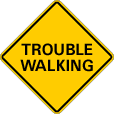



According to the New England Journal of Medicine, "migraine can sometimes lead to ischemic stroke and stroke can sometimes be aggravated by or associated with the development of migraine." Twenty-seven percent of all strokes suffered by persons under the age of 45 are caused by Migraine. Stroke is the third leading cause of death in this country. In addition, twenty-five percent of all incidents of cerebral infarction were associated with Migraines, according to the Mayo clinic. Most recently the British Medical Journal reported that after evaluating 14 major Migraine & stroke studies in the U.S. and Canada that Migraineurs are 2.2 times greater risk for stroke than the non-migraine population. That risk goes up to a staggering 8 times more stroke risk for women Migraineurs on the pill!Can you recognize ALL five correct Stroke symptoms? Can you identify an incorrect Stroke symptom? Do you know when you need to call 9-1-1 when someone appears to be having a Stroke? If you answered "no", you're not alone.
Results of the 2005 Behavioral Risk Factor Surveillance System (BRFSS) survey that was used in 13 states and the District of Columbia (DC) to examine public awareness of Stroke warning symptoms and the importance of seeking emergency care were examined in this week's issue of the CDC's Morbidity and Mortality Weekly Report article Awareness of Stroke Warning Symptoms --- 13 States and the District of Columbia, 2005. Out of 71,994 participants only 16.4% of respondents could recognize all five correct symptoms, identify an incorrect symptom and recognize the need to call 9-1-1.
May is Stroke Awareness Month. The National Institute of Neurological Disorders and Stroke (NINDS) developed the Know Stroke, Know the Signs. Act in Time campaign to educate the public about recognizing Stroke symptoms. If you don't know these five symptoms, take the time to learn them. If you already know them, teach them to someone else. At the very least, print them and attach them to your refrigerator so that your family can learn them.
- Sudden numbness or weakness of the face, arm, or leg (especially on one side of the body)
- Sudden confusion, trouble speaking or understanding speech
- Sudden trouble seeing in one or both eyes
- Sudden trouble walking, dizziness, loss of balance or coordination
- Sudden severe headache with no known cause
The NINDS says you may not realize you're having a stroke and you may not be able to call 9-1-1 on your own. The people around you may not know you're having a Stroke and just think you're confused. Don't waste precious time. Arriving at the hospital within 60 minutes after experiencing symptoms can greatly reduce Stroke damage. If you or someone you know is having a Stroke call 9-1-1 IMMEDIATELY.










0 comments:
Post a Comment